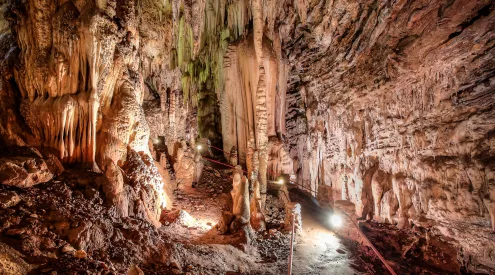The last-ever season of Game of Thrones has finally come to our screens. The newest installment of the show will bring many exciting events from the land of Westeros, with drama, plot twists and, in all likelihood, tragedy. While this may be the last time we see our favourite TV characters, the same can’t be said for the show’s filming locations. From Iceland, to Spain, to Greece, here are eight real-life Game of Thrones locations you can visit.
Dragonstone: Gaztelugatxe, Spain
While the castle does not exist in real life, the entrance with its 241 steps does. The steps lead up to San Juan de Gaztelugatxe, a church and one-time monastery. We first saw the Mother of Dragons return to Dragonstone in Season Seven. Located in Spain’s Basque Country, the site is a religious pilgrimage that has grown in popularity over the years.
View this post on Instagram
The Eyrie in the Vale of Arryn: Meteora, Greece
Game of Thrones wasn’t actually filmed here but the peaks of Meteora were digitally added in. In Season One, we see Tyrion Lannister’s first trial by combat, but before this he is imprisoned by Lysa Arryn in the Sky Cells. The view from the Sky Cells looks over these peaks. The area is a UNESCO World Heritage site and can be explored on foot or bicycle, or alternatively by traversing the Northern Greece valley by water on a raft.
View this post on Instagram
Iron Islands: Dunluce Castle, Ireland
The Iron Islands are in fact located off the Northern Island coast. Season Two of the show saw Theon Greyjoy return to his home, where we met the rest of the Greyjoy family and the Iron Fleet. The show’s creators adorned the castle with much of what we saw on the show. There isn’t an exact replica of of the Greyjoy’s towering castle at Pyke, but the beauty of the surrounds make up for that.
View this post on Instagram
Dothraki Sea: Bardenas Reales, Spain
Daenerys Targaryen was taken captive by Khal Moro of the Dothraki. The area in which she is forced to live is not a barren wasteland in the real world, but in fact a nature park in the northern part of Spain. The park measures approximately 40,470 hectares across Spain’s Navarre region and can be visited and traversed by foot, car or bicycle.
View this post on Instagram
Water Gardens of Dorne: Alcázar of Seville, Spain
Open daily for guided tours, the 700-year-old Andalusian palace is Europe’s oldest palace that is still in use. Game of Thrones fans first got to see this UNESCO World Heritage site during the fifth season of the show, when we visited the seat of House Martell for the first time. The building is a Moorish-style structure. It is home to Spain’s royal family, who live in the upper wings of the palace.
View this post on Instagram
Beyond the Wall: Vatnajökull National Park, Iceland
The place that the wildlings and white walkers call home is in fact a national park in Iceland. The icy landscape sets the scene for many of Jon Snow’s adventures in the earlier seasons. CGI was also used to make it seem like the ‘Land of Always Winter’. The glaciers and ice caves are all located in the Vatnajökull National Park, a protected area near Reykjavík.
View this post on Instagram
King’s Landing: Old Town Dubrovnik, Croatia
Since Season Two, we have seen Dubrovnik’s Old Town as King’s Landing, and tourism in the area has grown exponentially. The Croatian Tourist Board stated that over the course of 2018, 1,271,657 tourists visited Dubrovnik, many of which were interested in the Game of Thrones-inspired tourist activities. From walking tours that pass the site where Cersei Lannister was forced to do that brutal walk of shame to seeing where the Battle of Blackwater took place, visiting Dubrovnik’s Old Town means you’re visiting the capital of Westeros.
View this post on Instagram
Tower of Joy: Castle of Zafra, Spain
This location is where one of the most pivotal moments of Game of Thrones is filmed. We follow Bran Stark into the past, where we learn something very important about Jon Snow. The scene changes the proverbial game of the show. The castle is located in the Sierra de Caldereros, roughly a two-hour drive outside of Madrid, and can be reached by car from the village of Hombrados. Alternatively, one can hike to the castle.
View this post on Instagram
Feature image: Unsplash















